Karaganda – The Mining Town
Some 200 km southeast ward from the capital Astana is the famous northern town of Karaganda (also spelled as Qaraghandy or Karaghanda). What made Karaganda famous were coal, labor camps, and AIDS. This second biggest city in Kazakhstan after Almaty started its history when a small-scale coal mining settlement was built in 1857, and the mining developed fast after the completion of railway link in early 20th century. The town was actually founded in 1920s by mining slave labors, and the labor camp riots dominated Karaganda’s early history.
Mining industries of Karaganda, dominated by coal, included iron, steel work, and ore. Coming from Astana by bus, in early cold morning by a minibus which cost 1000 T a seat from Astana to Karaganda, I saw grey polluted air around the mining town of Karazhal, which supplied ore for industries in Karaganda. As a mining and industry city, I have learnt that Karaganda also processed another dark side: to be the place of majority HIV cases in the Republic of Kazakhstan.
My first image coming to Karaganda was bleak and grey. It was like the grey winter weather; combined by the color of pollution I spotted on Karazhal. Grey, was like my heart also when arrived here. Actually I had made contact with an Indian guy working in this city and he promised to take me around. When I arrived in front of the TsUM department store (all department stores in ex-Soviet Central Asian are known as TsUM or GUM or anything else similar, taken from its Russian abbreviation), I tried to call that Indian guy. But as any other Russians in Astana whom I contacted earlier, this man also did not answer any of my calls. I bet he learnt the Russian culture. There was no choice but to wander the city alone.
Anyway, Karaganda image in my heart changed slowly from grey to colorful, just at the same time, the weather changed slowly from grayish to a sunny one. Karaganda, despite of its history of labor riots and my bad mood due to an unfulfilled promise, changed to be a lovely town under a shinning winter sun. People started to walk around the street to enjoy the nice sun and friendly weekend. The pedestrian street was covered by snow, and I slipped many times when walking.
The main road doesn’t resemble any other typical Asian towns. Well, people may argue that Kazakhstan is too massive and can be considered as a transcontinental country: half in Asia and another part in Europe. But Karaganda should be still considered as Asia, despite of the Soviet architecture and town planning, Russian alphabets, and big portion of Russian ethnic. It was true to say that ethnic distribution in Kazakhstan can be drawn as a spectrum: Russian dominated towns sprawled along the northern border with Russia, and the proportion of Russian ethnic is getting less and less southward, to be almost complete Kazakh towns at the southern borders with Uzbekistan and Kyrgyzstan (this excluded Almaty, the metropolis of the country).
I admired the architectures in Karaganda. The theatre halls had statues of musicians, the buildings are decorated with Soviet-style slogans, and Lenin statue watched the bleak apartment buildings with similarly bleakish sight. The people held strong Russian culture compared to other part of Central Asia. I never expected to get special attention as a foreigner, like I used to be in Tajikistan, for example. People only speak important things and long, meaningless greetings with strangers can be forgotten.
I also learnt that Russian (thus Western) influence was incredibly stronger in Kazakhstan compared to other Central Asian countries. Since my first day in Kazakhstan, from Almaty, Astana, to Karaganda, I couldn’t remember where Kazakh language dominated the conversation, except in vegetable bazaars. Everybody spoke Russian. Most of the slogans are in Russians, or if Kazakh language existed, it was kind of translation of the Russian ones. Russian culture, Soviet past, was not nostalgia but still survived in the daily life in Almaty and northern cities of Kazakhstan.
When I tried to get a lunch, I entered a salad shop. Here, the shopkeeper had to weigh anything she needed to add to the salad. First the empty plate was weighed. The scale was reset. Then the mashed potato, as what I ordered, was weighed. 95 grams. She added little bit more potato to the plate. Oops, now 102 grams. She reduced the potato little by little until the scale show exactly 100 grams. The sauce was added to the plate, also a spoon by a spoon until reached the exact number ordered by the boss in the shop guidelines. Everything here was exact. No bargain, no discussion, no compromise. This was, for an Asian like me, not quite Asian attitude.
I remembered in Kyrgyzstan and Tajikistan you might order food in the restaurants not for a full portion but for 0.5 and 0.7 portions, with different price. In Kazakhstan, as where even mashed potato was given by exact measurement, it might be not a matter whether you ordered a full portion of rice or a half one, but it wouldn’t be too surprising if they could set different prices for, let’s say, 0.71, 0.84, and 0.65 portions.
I caught an afternoon train back to Almaty. It was just a day trip in Karaganda, but as this was a freezing winter, it was very painful to pass the time lingering along the streets. The train to Almaty was very crowded. I think most passengers already filled the train since its departure from Astana. There was a young soldier, with Russian flag on his arms, but his face was Asian. After chatting a while with his father, I learnt that this boy was 18 year old Korean boy named Kolya (Koreans in ex-Soviet countries have Russian names instead of Korean ones), and served military service in Russia. He had become Russian citizen, and his father, still holding Kazakhstan passport, was very proud of his ‘Russian’ son.
The 16 hour journey to Almaty seemed very fast, as most of time was spent inside the train, and I arrived the next morning in the lovely southern city.

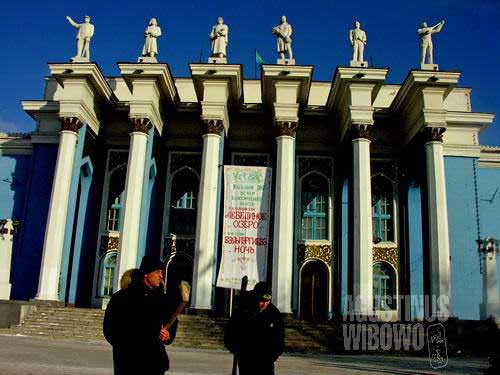
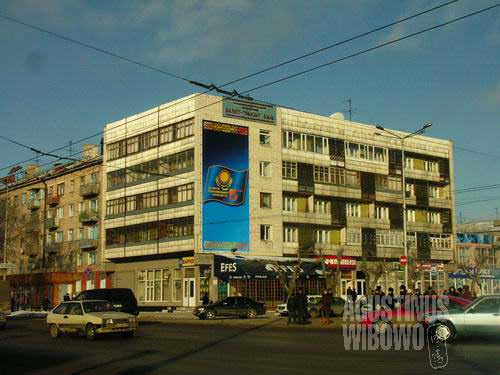
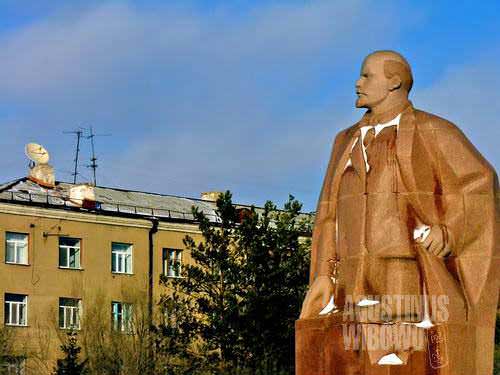

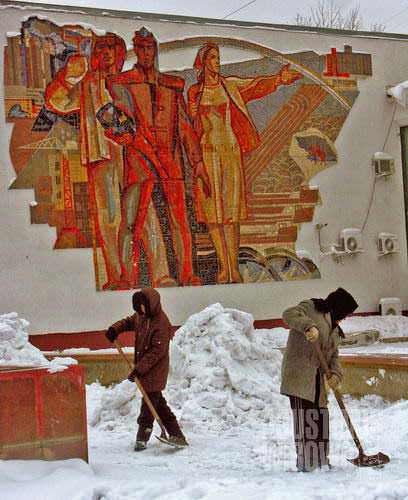
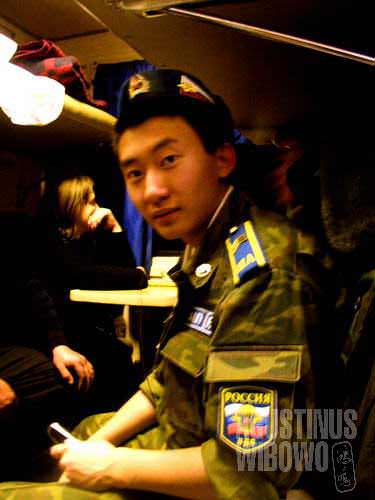





Leave a comment